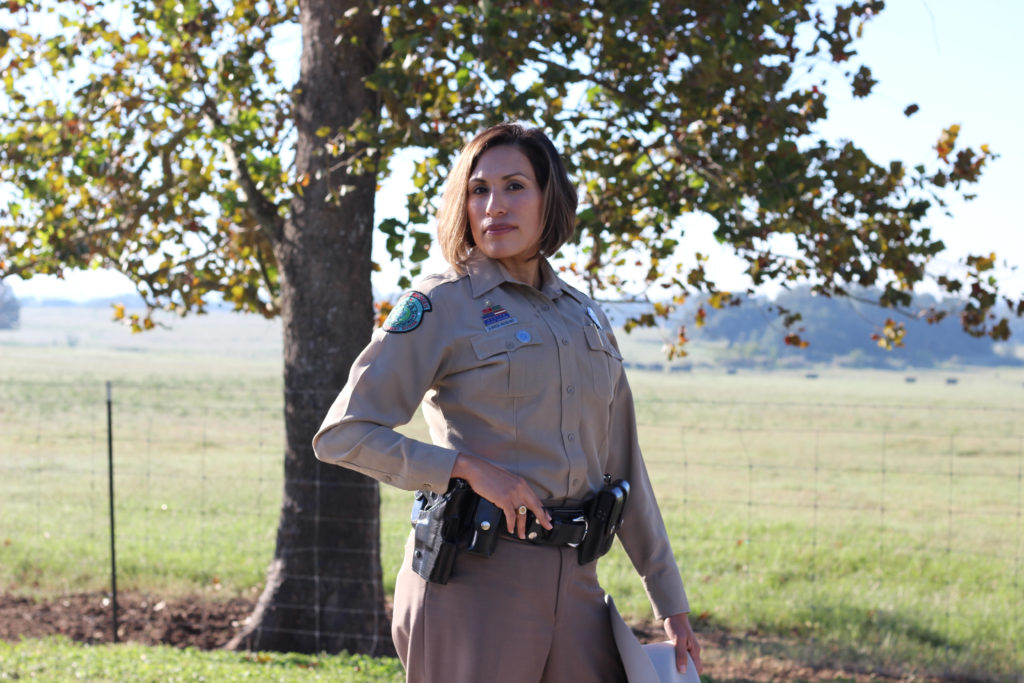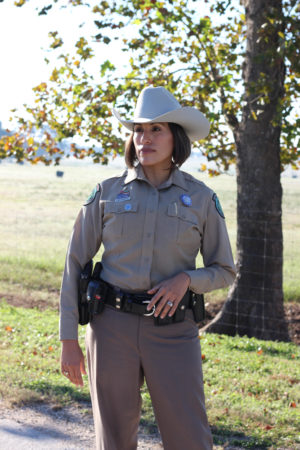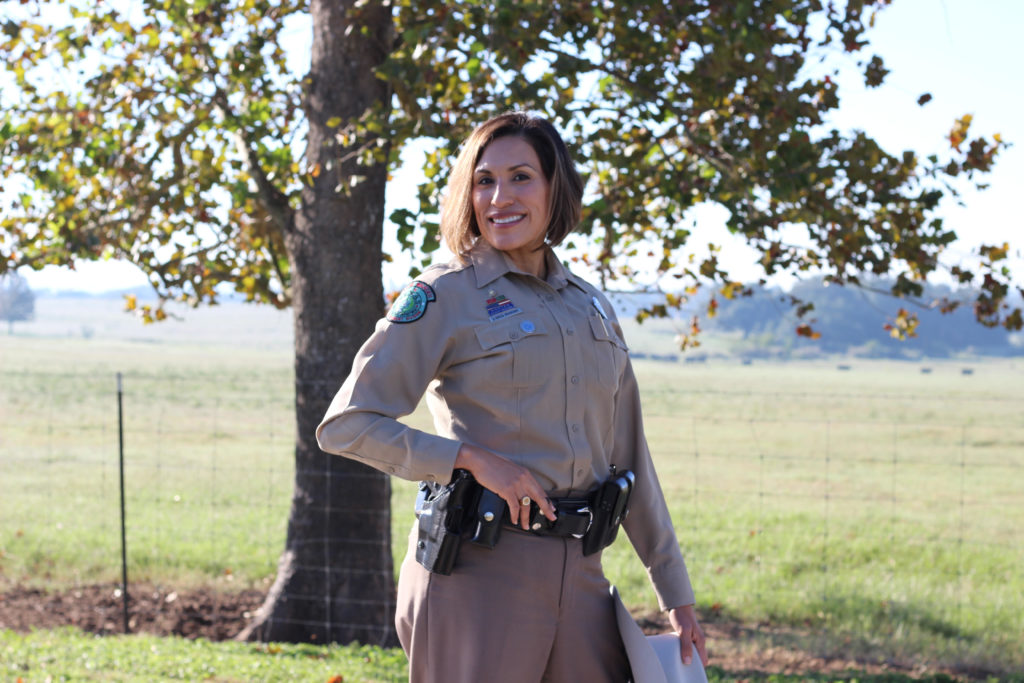Texas Game Warden Joann Garza-Mayberry speaks about her 15-year career.
By Emy Cies, Photos by Bonnie Dredla

It’s one of the toughest jobs in the state for a reason, but law enforcement is still a man’s world.
“We, as a society, don’t bring up our little girls to become police officers,” says Caldwell County Game Warden Joann Garza-Mayberry. “And we only know what we’re exposed to.”
Women in law enforcement stand out because it’s traditionally a male-dominated field.Although there are more women in law enforcement than ever before, the percentage of women police officers in Texas is still relatively low. Women make up more than half of the state’s population, but only about 11.5 percent of licensed peace officers. A total of 265 police departments in the state have no female officers and 189 have only one.
“A lot of people tell me, ‘Oh, I’ve never seen a female game warden,’ ” Garza-Mayberry explains. “I always say, ‘I may be first but I won’t be the last!’ ”
Garza-Mayberry, who is nearing 15 years in law enforcement, believes bringing more women into law enforcement means leading by example.
About 7 percent of Texas Parks & Wildlife game wardens are women, but the department is making strides to attract women through awareness and education.
“I grew up with a calling to serve the community, but at the time, I didn’t know what that calling was,” Garza-Mayberry says. “My family were big campers when I was growing up, and I was always outdoors.”
Garza-Mayberry went on her first ride-along with a male game warden in Brownsville/South Padre Island, Texas, and something clicked. She immediately knew the job was meant for her, but never saw a female game warden until entering the academy.
“This is not just a problem in Texas,” Garza-Mayberry exclaims. “Nationwide, it’s is a difficult time for people in law enforcement. No amount of training can guarantee your safety, but it’s very rewarding to help those who can’t help themselves, rescuing citizens from natural disasters and conserving nature for the future. To me, there is no better profession than a Texas game warden.”
 Today, game wardens are part certified peace officer and part wildlife manager. They enforce hunting and fishing laws, protect natural resources and oversee boating safety. Every day, they patrol the state’s nearly 3 million surface acres of water and 700,000 acres of land, open to more than 1.2 million hunters a year, all while maintaining state criminal laws, participating in disaster-relief efforts and educating the public about the preservation of wildlife.
Today, game wardens are part certified peace officer and part wildlife manager. They enforce hunting and fishing laws, protect natural resources and oversee boating safety. Every day, they patrol the state’s nearly 3 million surface acres of water and 700,000 acres of land, open to more than 1.2 million hunters a year, all while maintaining state criminal laws, participating in disaster-relief efforts and educating the public about the preservation of wildlife.
While Texas game wardens occasionally run into dangerous situations, fighting crime is only a small fraction of the job. It’s more about helping people and communicating with the public, a job women do just as well if not better than their male counterparts.
“It’s a harmful stereotype that women are weaker than men. In the field, we say work smarter, not harder,” Garza-Mayberry says. “Women have to work harder to avoid a physical altercation. We use our emotional intelligence and our voice as a tool to de-escalate situations.”
According to the National Center for Women and Policing, female presence in the police force can lead to safer communities, as women are less likely to use excessive force. They are natural mediators and look for non-physical solutions.
“We have height and weight against us, but we use our communication skills, tact and ability to communicate with women and children, which is more than half of the population,” Garza-Mayberry says. “Not everybody you encounter is going to be happy to see you. Relationships with people in the community and good communication skills are essential.”
But getting more women to go into the field of law enforcement remains a challenge. In 1971, women made up just 1.4 percent of all police officers. Decades later, that number has grown to only 13 percent.
“Getting out there is so important,” Garza-Mayberry says. “People need to actually see women in an occupation that they automatically assume is male.”
Today, Garza-Mayberry is involved with programs that work toward involving and educating women about careers across local, state and federal police departments and continues to reach out to women through educational opportunities throughout the state.
“I started working with San Antonio Police Department’s Women in Law Enforcement because I saw the need in my own community,” Garza-Mayberry says. “It would have been so much easier for me to get involved in law enforcement earlier if I’d had the same outreach opportunities.”
SAPD’s Women in Law Enforcement series provides opportunities for women to hear from female officers in all three levels of jurisdiction, from Texas Parks & Wildlife to the FBI, with the goal of encouraging female recruitment.
In Caldwell County, female game wardens provide an annual large-scale free event for women and girls that includes fishing, kayaking, archery and wildlife identification. They provide a fun and interesting way to show positive examples of women succeeding in the field, a great way to get girls involved and teach skills that will continue to give for a lifetime.
“I believe there is a need for that, a need for women to see other women,” Garza-Mayberry explains.

She is also involved in Women in the Wild and Texas Outdoor Women Network Rockport, which aims to empower women by teaching them new skills, encouraging networking and creating a female-friendly environment to learn.
Garza-Mayberry is also often featured on Animal Planet’s Lone Star Law, a reality TV show that follows the numerous game wardens of Texas Parks & Wildlife. It showcases the excitement of game wardens working in the field, protecting wild animals, wild places and keeping the public safe.
Garza-Mayberry’s efforts seem to be working. Women are applying for warden positions and the numbers of women enrolling in the game warden academy continues to grow. About a tenth of applicants today are women. When Garza-Mayberry entered the game warden academy, she was the only graduating female cadet in a class of 40.
“Any physiological barrier of being outnumbered by men is eliminated in the academy,” Garza-Mayberry explains. “We have an intense bonding experience of working together.”
Game warden cadets must complete about 7 months and 1,200 hours of training in the academy.
“It changed me as a person,” Garza-Mayberry says. “I did things I never thought I could have done. Now I never let anything discourage me. It made me mentally strong and the person I am today.”
While they are raising awareness and establishing presence, women in law enforcement have to prove themselves constantly and stay strong.
“I counted around 17 female names on a list of about 500 game wardens when I was in the academy and we’ve more than doubled that number since,” Garza-Mayberry says proudly. “We are smart, we are capable, we are committed to serve and we are ready to make a difference.”


